Table of Contents
- What is a Low Carb High Protein Diet?
- The Benefits of Low Carb High Protein Meals
- Best Protein Sources for a Low Carb Diet
- Delicious Low Carb High Protein Recipes
- Tips for Following a Low Carb High Protein Diet
- Challenges and Side Effects
- Maintaining Long-Term Success
What is a Low Carb High Protein Diet?
A low carb high protein diet focuses on consuming foods that are low in carbohydrates and high in protein. By reducing carb intake and increasing protein intake, this diet can promote weight loss, improve satiety, and provide other health benefits.
The Benefits of Low Carb High Protein Meals
Low carb high protein meals offer several benefits, including increased weight loss, improved blood sugar control, reduced cravings, and better muscle maintenance. Discover how this diet can positively impact your health and wellness.
A low carb high protein diet is gaining popularity among health-conscious individuals due to its numerous benefits. Here are some advantages of incorporating low carb high protein meals into your diet:
1. Weight Loss:
Low carb high protein meals can be effective in promoting weight loss. Protein is known to have a higher satiety value than carbohydrates, making you feel fuller for longer periods. Additionally, a reduction in carbohydrate intake can lead to decreased insulin levels and increased fat burning.
2. Improved Muscle Health:
High protein content in low carb meals helps support and maintain muscle health. Protein is crucial for muscle repair and growth, making it essential for athletes, bodybuilders, and individuals engaging in regular physical activity.
3. Better Blood Sugar Control:
A low carb high protein diet can assist in regulating blood sugar levels. By limiting carbohydrate intake, there is a reduced impact on blood sugar levels, minimizing the risk of insulin spikes and potential health complications such as diabetes.
4. Increased Energy Levels:
Protein provides a steady release of energy compared to carbohydrates. Consuming low carb high protein meals can help avoid the energy crashes often associated with high-carbohydrate meals, providing a sustained energy supply throughout the day.
5. Reduced Cravings:
Protein is known to have appetite-suppressing effects, reducing hunger cravings and overeating. Incorporating more protein into your meals can help you stay satisfied and curb the desire for unhealthy snacks.
With all these benefits, it is important to consult with a healthcare professional or nutritionist before making any significant changes to your diet. They can provide personalized advice and ensure you are meeting your individual nutritional needs.
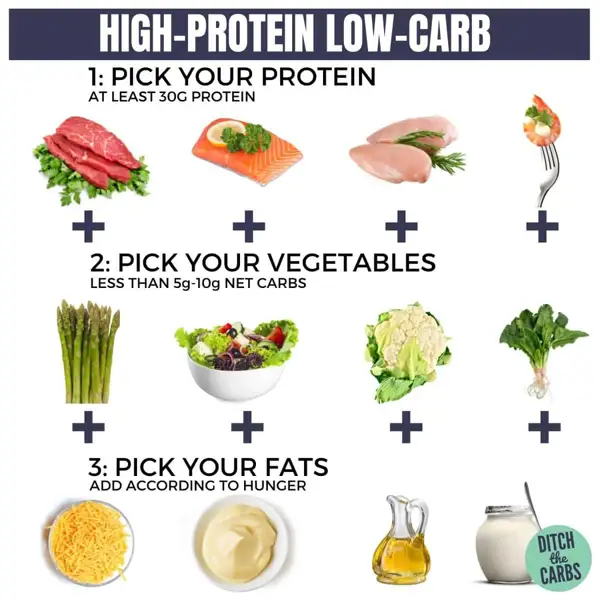
Best Protein Sources for a Low Carb Diet
Protein is an essential nutrient for a low carb diet. Learn about the best sources of protein that fit perfectly into your low carb meal plan, including lean meats, fish, eggs, dairy products, and plant-based options.
If you are following a low carb high protein diet, it is essential to choose the right protein sources. Here are some of the best protein sources you can incorporate into your low carb meals:
- Chicken: Chicken breast is an excellent source of lean protein and is low in carbohydrates.
- Fish: Fish, such as salmon, tuna, and mackerel, is rich in omega-3 fatty acids and provides a high-quality protein with minimal carbs.
- Lean Beef: Choose lean cuts of beef like sirloin, tenderloin, or top round, as they are low in carbs and provide ample protein.
- Eggs: Eggs are a complete protein source and are virtually carb-free. They are versatile and can be included in various low carb meals.
- Greek Yogurt: Greek yogurt is a high protein dairy option with fewer carbs compared to regular yogurt. It also contains gut-friendly probiotics.
- Tofu: Tofu is a great vegetarian protein source that is low in carbs. It can be included in stir-fries or salads for a protein boost.
These protein sources can be combined with low carb vegetables like broccoli, spinach, and kale to create delicious and nutritious meals for your low carb high protein diet.
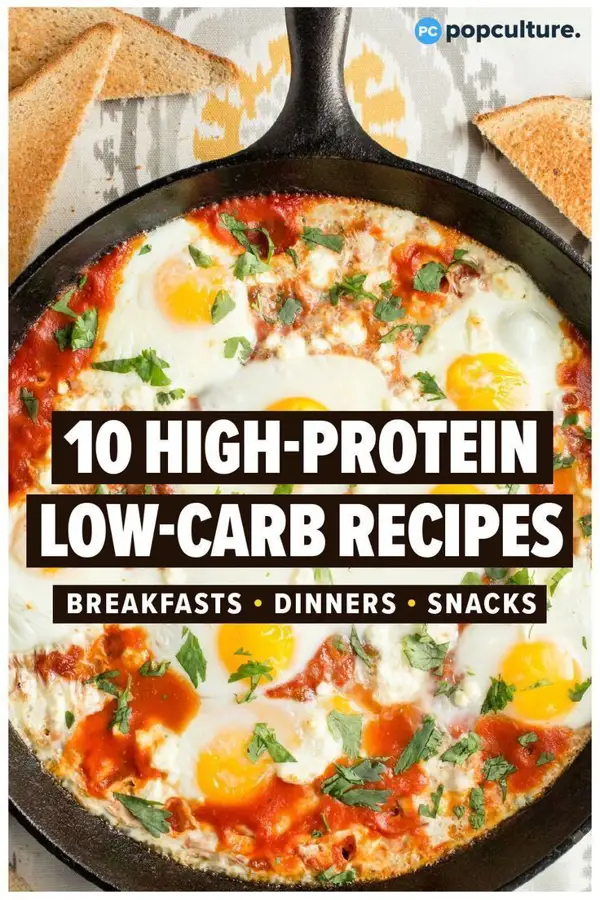
Delicious Low Carb High Protein Recipes
Get inspired by these mouthwatering recipes that are both low in carbs and high in protein. From satisfying breakfast options to hearty main dishes and delightful snacks, there's a wide range of flavors to suit every palate.
Welcome to our website dedicated to providing you with mouthwatering low carb high protein recipes. Whether you are following a low carb high protein diet or simply looking to incorporate healthier meals into your routine, you have come to the right place. Here, we share some of our favorite recipes that are both nutritious and satisfying.
Recipe 1: Grilled Chicken with Broccoli
Enjoy a protein-packed meal with this delicious grilled chicken recipe. Marinated with flavorful herbs and spices, the juicy chicken pairs perfectly with a side of steamed broccoli. This simple and nutritious dish is sure to satisfy your cravings.
Recipe 2: Baked Salmon with Asparagus
Indulge in the goodness of omega-3 fatty acids with this baked salmon and asparagus recipe. The tender and flaky salmon, seasoned with lemon and herbs, complements the crispy roasted asparagus. This dish not only offers a high protein content but also provides essential nutrients.
Recipe 3: Quinoa and Vegetable Stir-Fry
For a vegetarian-friendly option, try this quinoa and vegetable stir-fry. Packed with plant-based protein, quinoa is stir-fried with colorful veggies and aromatic spices. This recipe offers a perfect balance of taste, texture, and nutritional value.
Visit our Recipes page for more delectable ideas to enhance your low carb high protein diet. Don't compromise on taste while maintaining a healthy lifestyle!
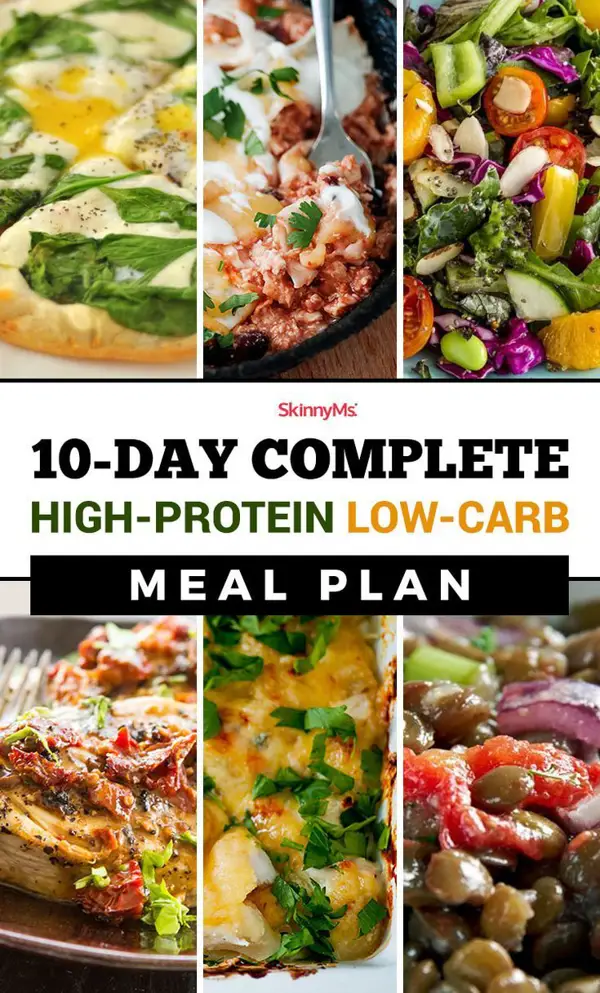
Tips for Following a Low Carb High Protein Diet
Successfully adopting a low carb high protein diet requires some guidance. Explore essential tips, such as meal planning, smart grocery shopping, reading food labels, and incorporating physical activity into your routine.
1. Plan Your Meals
Take some time to plan your meals ahead of time. This will help you ensure that you're getting enough protein while keeping your carbohydrate intake low. Prepare a weekly meal plan and make a shopping list to help you stay organized.
2. Include Protein-Rich Foods
Incorporate a variety of protein-rich foods into your diet, such as lean meats (chicken, turkey, fish), eggs, tofu, Greek yogurt, and legumes. These foods are not only low in carbs but also provide essential nutrients and help you feel satisfied.
3. Avoid Processed Carbohydrates
Avoid processed carbohydrates such as white bread, sugary snacks, and refined grains. These foods can cause spikes in blood sugar levels and lead to cravings. Opt for whole grain alternatives, such as brown rice, quinoa, and whole wheat bread.
4. Fill Up on Vegetables
Incorporate a wide range of vegetables into your meals. They are low in carbs, high in fiber, and packed with vitamins and minerals. Aim for non-starchy vegetables like spinach, broccoli, peppers, and zucchini, which can be included in salads, stir-fries, and side dishes.
5. Stay Hydrated
Drinking enough water is essential when following a low carb high protein diet. Water helps with digestion, metabolism, and can aid in curbing hunger. Make sure to drink at least 8 cups of water per day.
6. Don't Skip Breakfast
Start your day with a protein-rich breakfast to keep you energized and satisfied. This can include scrambled eggs, a protein shake, or Greek yogurt with berries. A good breakfast sets the tone for the rest of your day.
7. Snack Smart
When hunger strikes between meals, opt for high protein snacks. Some great choices include nuts, seeds, cottage cheese, protein bars, or beef jerky. These snacks will keep you full and prevent you from reaching for unhealthy, high-carb options.
8. Read Food Labels
When shopping for groceries, read food labels carefully. Pay attention to the carbohydrate and protein content in the products you purchase. This will help you make informed choices and avoid hidden carbs in processed foods.
9. Moderate Fruit Intake
While fruits are nutritious, they also contain natural sugars. Limit your fruit intake and choose lower-sugar options like berries or citrus fruits. Remember to account for the carbohydrates from fruits in your overall daily carb limit.
10. Seek Professional Advice
Consulting a registered dietitian or nutritionist can provide you with personalized guidance and ensure you're meeting your nutritional needs. They can help tailor a low carb high protein diet that suits your goals, health, and preferences.
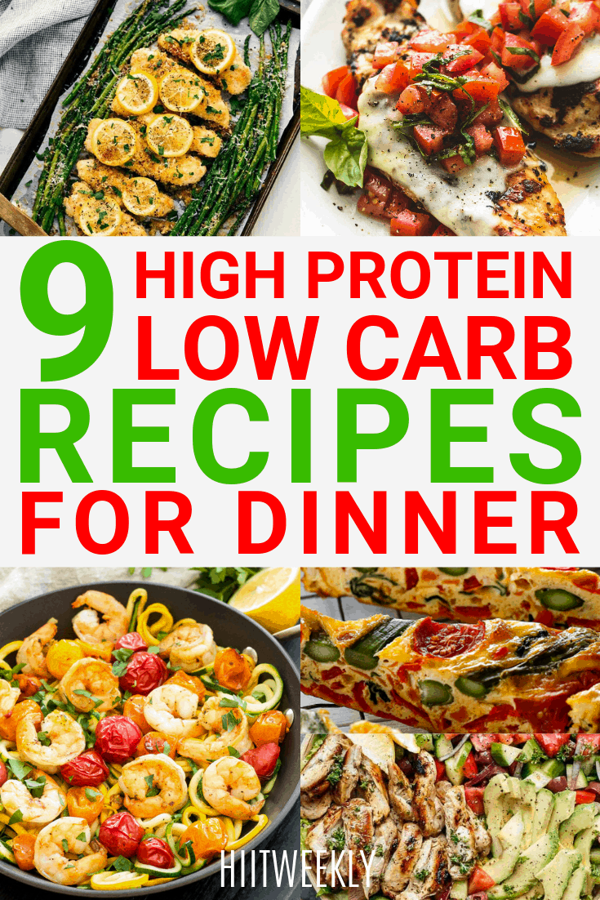
Challenges and Side Effects
While a low carb high protein diet offers many advantages, it's important to be aware of potential challenges and side effects. Learn about possible issues like nutrient deficiencies, constipation, and the risk of ketoacidosis.
A low carb high protein diet is popular among individuals aiming to lose weight and improve overall health. While it can have many benefits, it also comes with its own set of challenges and potential side effects that should be taken into consideration.
Challenges
- Cravings: Cutting carbohydrates from your diet may lead to increased cravings for sugary or starchy foods, especially during the initial transition phase.
- Dietary restrictions: Low carb high protein diets often restrict or limit certain food groups such as grains, fruits, and starchy vegetables, which may require careful meal planning to ensure a balanced nutrient intake.
- Social impact: Following a specialized diet can sometimes make it challenging to dine out or socialize, as many traditional meals and gatherings revolve around carb-heavy foods.
Side Effects
- Initial discomfort: As your body adjusts to a low carb high protein diet, you may experience initial discomfort such as fatigue, headache, or dizziness. These symptoms are often temporary and referred to as "keto flu".
- Nutrient deficiencies: Restricting certain food groups may lead to inadequate intake of essential nutrients such as fiber, vitamins, and minerals. It is crucial to incorporate a wide variety of foods and consider supplementation if necessary.
- Digestive issues: Some individuals may experience digestive issues like constipation or changes in bowel movements due to a decrease in dietary fiber intake.
It is important to consult with a healthcare professional or a registered dietitian before starting any new diet, especially if you have pre-existing medical conditions or dietary concerns. They can provide personalized guidance and help mitigate potential challenges and side effects.
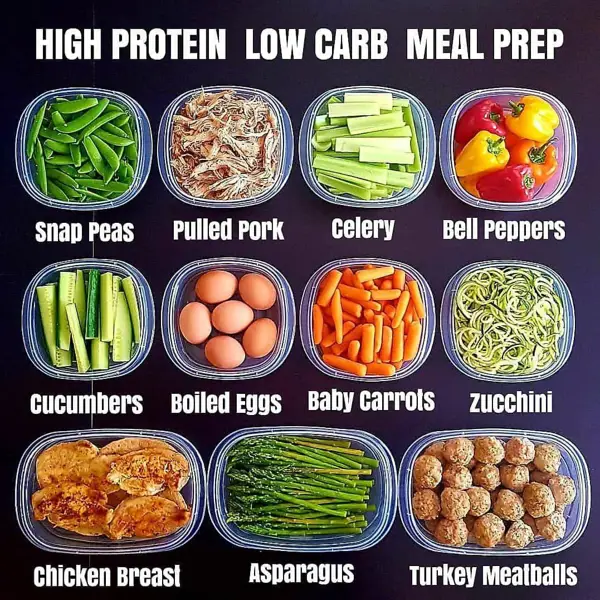
Maintaining Long-Term Success
To ensure long-term success with a low carb high protein diet, it's crucial to establish healthy habits and sustainable eating patterns. Discover strategies for overcoming obstacles, staying motivated, and achieving your health goals.
Eating a low carb high protein diet can provide numerous health benefits and aid in weight loss. However, maintaining long-term success in this dietary approach requires consistency, proper planning, and certain considerations.
1. Variety in Protein Sources
To prevent taste bud fatigue and provide a wide range of nutrients, it is important to include various protein sources in your low carb high protein meals. This can include lean meats such as chicken, turkey, and fish, as well as plant-based proteins like tofu, tempeh, and legumes.
2. Adequate Fiber Intake
Although low carb diets prioritize protein consumption, it is equally essential to incorporate high-fiber foods. This can include leafy greens, cruciferous vegetables, and nuts, which help promote digestion, keep you full for longer, and support overall gut health.
3. Portion Control
While focusing on low carb high protein meals, it is crucial to maintain portion control. Consuming excess calories, even from protein sources, can hinder weight loss progress. Therefore, measure your servings and keep track of your overall calorie intake to stay on track.
4. Hydration
Proper hydration is often overlooked but plays a vital role in any diet plan. Drinking sufficient water not only aids in digestion but also helps curb unnecessary food cravings and keeps you feeling energized throughout the day.
5. Consistency and Lifestyle Adjustment
Achieving and maintaining success in a low carb high protein diet requires consistency and adapting it as a sustainable lifestyle choice. It is important to create a balance between your dietary choices and overall wellness goals, including exercise and stress management.
Maintaining long-term success in a low carb high protein diet requires a mindful and well-rounded approach. By incorporating variety in protein sources, ensuring adequate fiber intake, practicing portion control, staying hydrated, and committing to a consistent lifestyle adjustment, you can reap the benefits of this dietary approach in the long run.
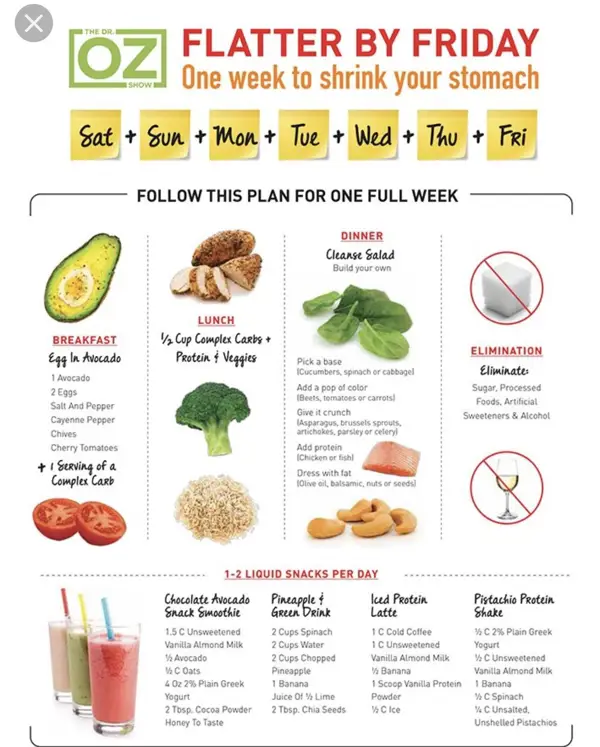
Key Takeaways
- A low carb high protein diet involves reducing carb intake and increasing protein consumption.
- Benefits include weight loss, improved blood sugar control, reduced cravings, and muscle maintenance.
- Protein sources for this diet include lean meats, fish, eggs, dairy products, and plant-based options.
- Try out delicious low carb high protein recipes for a satisfying and healthy meal plan.
- Follow essential tips like meal planning and smart grocery shopping to successfully adopt this diet.
- Be aware of potential challenges and side effects such as nutrient deficiencies and constipation.
- Maintain long-term success by establishing healthy habits and overcoming obstacles.
Frequently Asked Questions
1. Can I lose weight on a low carb high protein diet?
Yes, a low carb high protein diet can aid in weight loss by promoting satiety, reducing cravings, and boosting metabolism.
2. Are there any risks associated with this diet?
While generally safe, individuals with certain medical conditions should consult their healthcare provider before starting any new diet plan.
3. Can I follow this diet if I'm a vegetarian?
Absolutely! There are plenty of plant-based protein sources like tofu, tempeh, seitan, legumes, and nuts that can be included in a low carb high protein vegetarian diet.
4. Can I consume too much protein?
Consuming excess protein can strain your kidneys. However, for most healthy individuals, following a moderate protein intake is unlikely to cause any issues.
5. Should I consult a dietitian before starting this diet?
While not necessary for everyone, consulting a dietitian can be beneficial in ensuring you're meeting your nutritional needs and customizing the diet plan according to your goals and preferences.



Recent Comments